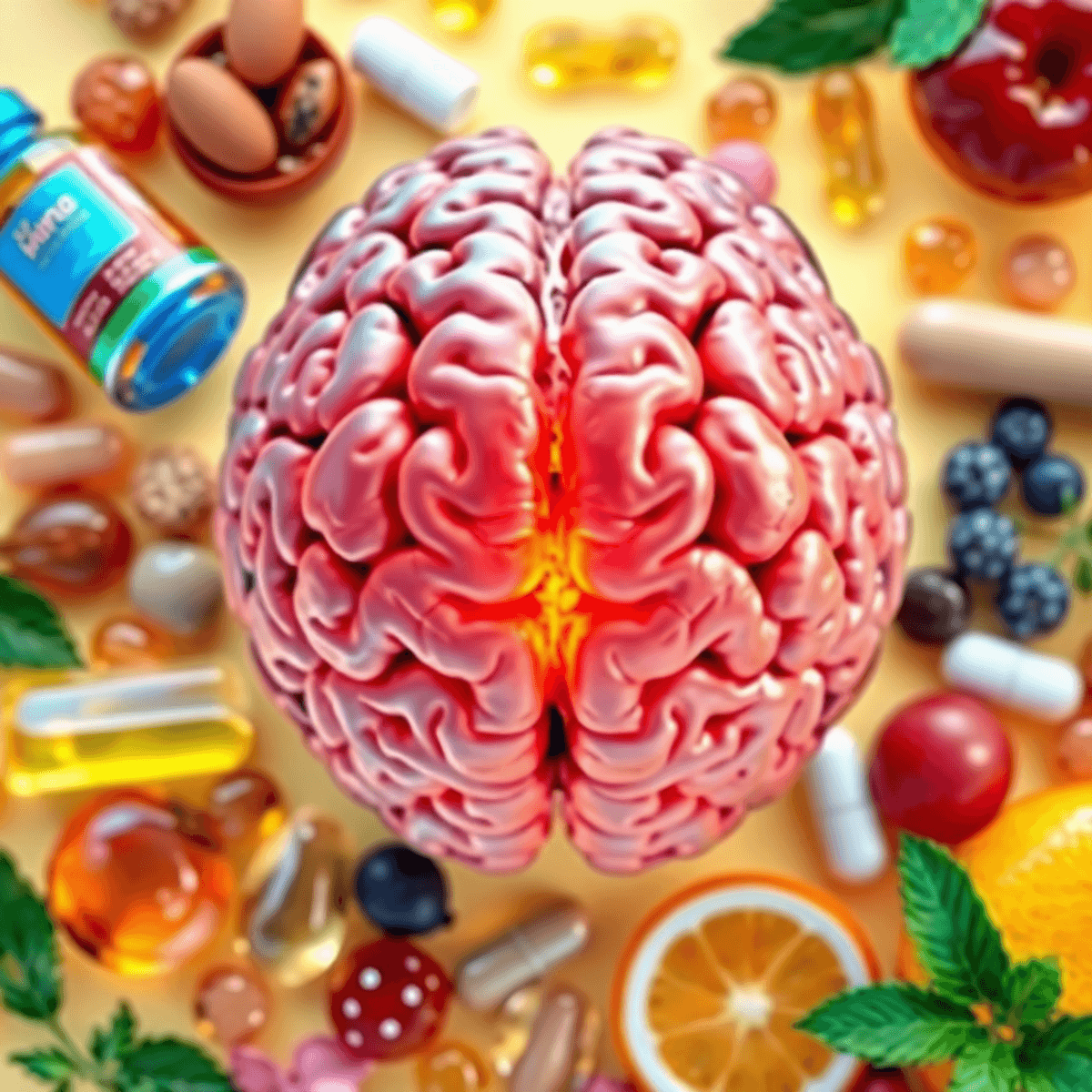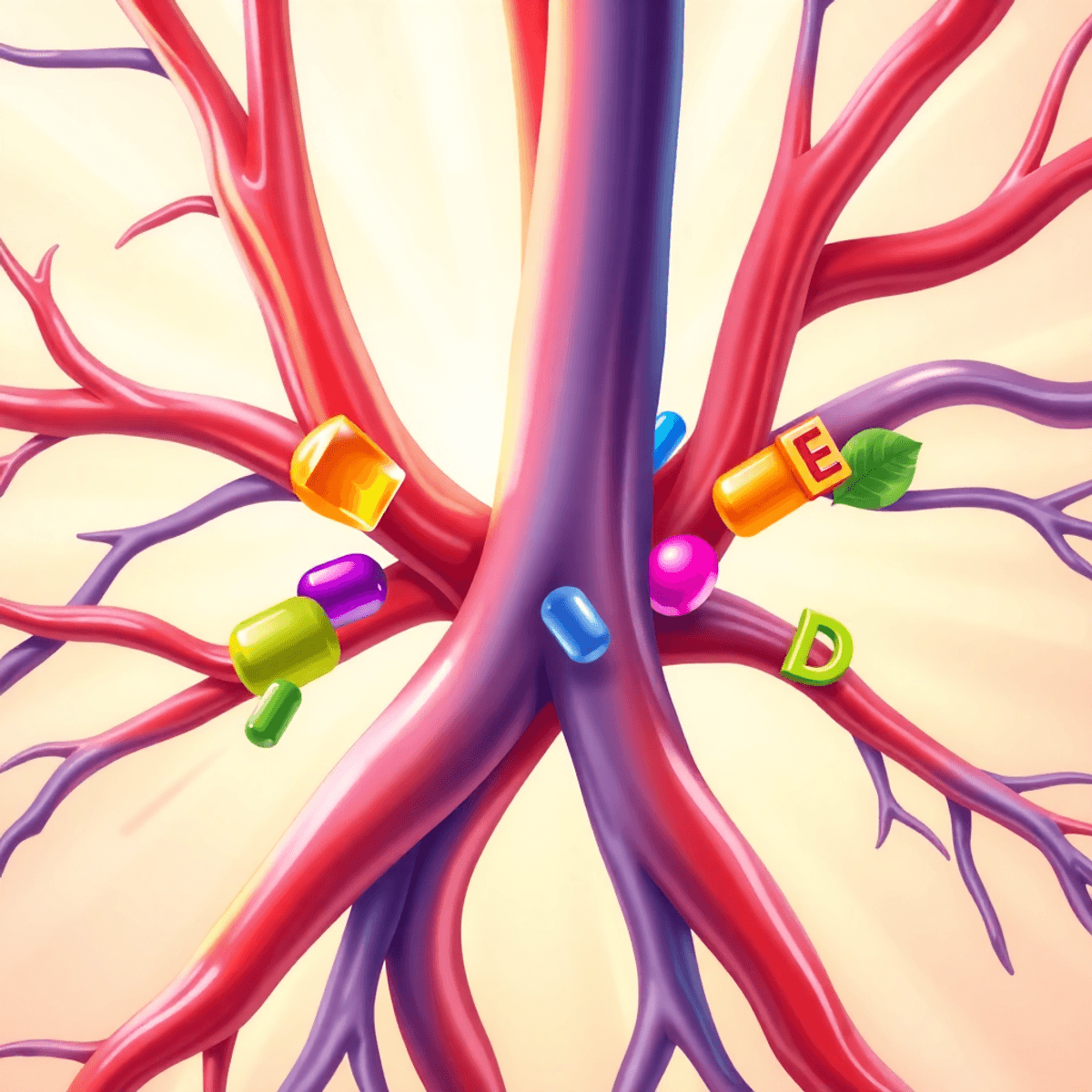Introduction
Your brain is the command center of your body, controlling every thought, movement, and memory. Just like a high-performance computer needs quality parts to work its best, your brain needs specific nutrients to stay sharp.
Studies show that certain vitamins are crucial for keeping your mind sharp, improving memory, and protecting against age-related cognitive decline. These essential nutrients help build neurotransmitters, repair brain cells, and fight oxidative stress.
In this guide, you’ll discover the top brain-boosting vitamins that can help:
- Enhance memory retention
- Improve focus and concentration
- Support cognitive function
- Protect against neurodegenerative conditions
We’ll explore six key vitamins that can transform your mental performance, including the powerful omega-3 fatty acids found in fish and the neuroprotective effects of vitamin E. You’ll learn how these vital nutrients work together to create an optimal environment for brain health, backed by scientific research and practical tips for incorporating them into your daily routine.
The Role of Vitamins in Brain Health
Your brain requires specific nutrients to maintain peak performance and protect against cognitive decline. Vitamins act as essential building blocks for brain function, supporting everything from neurotransmitter production to cellular repair.
Think of vitamins as the brain’s maintenance crew:
- Neurotransmitter Production: B-complex vitamins help create and regulate chemical messengers in your brain
- Cell Protection: Antioxidant vitamins (like C and E) shield brain cells from damage
- Energy Generation: Several vitamins convert food into the fuel your brain needs
- DNA Synthesis: Specific vitamins aid in creating and repairing brain cell structures
The brain-nutrition connection runs deep. Research shows that people who maintain vitamin-rich diets experience:
- Better memory retention
- Improved focus and concentration
- Enhanced problem-solving abilities
- Reduced risk of cognitive disorders
A balanced diet provides your brain with these vital nutrients through:
- Fresh fruits and vegetables
- Whole grains
- Lean proteins
- Healthy fats
- Seeds and nuts
Your brain consumes about 20% of your body’s energy, making proper nutritional support crucial for cognitive performance. When you don’t get enough vitamins, your brain function can decline, affecting memory, mood, and mental clarity. Studies indicate that vitamin deficiencies correlate with increased risks of depression, anxiety, and cognitive impairment.
Key Vitamins for Brain Power
Your brain requires specific vitamins and nutrients to function at its peak performance. Research has identified several essential vitamins that play crucial roles in maintaining cognitive health and preventing age-related mental decline.

1. Omega-3 Fatty Acids
Omega-3 fatty acids serve as building blocks for brain cell membranes and support neural communication. These essential fats help:
- Reduce brain inflammation
- Protect against cognitive decline
- Support memory formation
- Enhance focus and concentration
- Lower the risk of neurodegenerative diseases
Daily Recommended Intake: 1,000-2,000mg of combined EPA and DHA
Rich Food Sources:
- Fatty Fish: Salmon (2,260mg per 3.5oz serving), Mackerel (2,600mg per 3.5oz serving), Sardines (1,480mg per 3.5oz serving)
- Plant-Based Options: Flaxseeds (2,350mg per tablespoon), Chia seeds (5,060mg per ounce), Walnuts (2,570mg per ounce)
Research shows that people who consume omega-3-rich foods regularly demonstrate better cognitive performance and slower rates of mental decline. Studies indicate a 47% lower risk of developing dementia in individuals who maintain adequate omega-3 levels through diet or supplementation.
The brain-boosting effects of omega-3s become particularly significant as you age. These fatty acids help maintain the structural integrity of brain cells while supporting the formation of new neural connections – a process essential for learning and memory retention.
2. B Vitamins (B6, B9, B12)
B vitamins are essential for maintaining a healthy brain. They play a crucial role in the production of neurotransmitters and overall cognitive function. Each type of B vitamin has its own specific benefits for your brain:
Benefits of B Vitamins for Brain Health
B6 (Pyridoxine)
- Helps produce serotonin and dopamine
- Supports memory formation
- Regulates mood and sleep patterns
B9 (Folate)
- Important for DNA synthesis and repair
- Lowers homocysteine levels associated with cognitive decline
- Aids in the formation of new cells in the brain
B12 (Cobalamin)
- Maintains protective coverings around nerve cells
- Prevents shrinkage of the brain
- Necessary for the production of red blood cells
Consequences of B Vitamin Deficiencies
Studies have shown that not getting enough B vitamins can result in:
- Memory loss
- Depression
- Decline in cognitive abilities
- Higher chances of developing dementia
Food Sources Rich in B Vitamins
You can find these vitamins in various foods:
- Animal products: eggs, dairy, meat
- Plant-based options: legumes, leafy greens
- Fortified foods: cereals, nutritional yeast
- Whole grains: brown rice, quinoa
The amount of B vitamins you need each day depends on your age and health condition. It’s important to note that these vitamins work best when taken together – consuming them as a group can enhance their individual benefits for brain health.
3. Vitamin E
Vitamin E is a powerful antioxidant that protects your brain cells from harmful oxidative stress, which is a major factor in age-related cognitive decline. Research published in the Journal of Alzheimer’s Disease shows that vitamin E has protective effects against free radical damage, which can cause cellular deterioration in the brain.
Studies have found that people with higher levels of vitamin E tend to perform better cognitively and have a lower risk of developing Alzheimer’s disease. One significant study at the National Institute on Aging discovered that vitamin E supplementation slowed functional decline in patients with moderate Alzheimer’s by up to 19%.
You can increase your vitamin E intake by including these nutrient-rich foods in your diet:
- Sunflower seeds (1 oz = 7.4 mg)
- Almonds (1 oz = 6.8 mg)
- Hazelnuts (1 oz = 4.3 mg)
- Spinach (1 cup = 3.7 mg)
- Avocado (1 whole = 2.7 mg)
- Sweet potato (1 medium = 2.1 mg)
The recommended daily allowance for vitamin E is 15 mg for adults. By following a balanced diet that includes these foods, you can help maintain optimal brain protection and support long-term cognitive health.
4. Vitamin C
Vitamin C is a powerful defender of brain health. It helps maintain the integrity of blood vessels and fight inflammation. Research shows that this essential nutrient prevents oxidative damage to brain cells and supports the production of important neurotransmitters.
Studies have found a direct link between low vitamin C levels and an increased risk of Alzheimer’s disease. Your brain needs vitamin C for:
- Creating neurotransmitters for proper cognitive function
- Protecting neurons from inflammatory damage
- Supporting the formation of myelin sheaths around nerve cells
- Maintaining healthy blood flow to brain tissues
You can increase your vitamin C intake by including these foods in your diet:
- Citrus fruits: oranges, lemons, grapefruits
- Berries: strawberries, raspberries
- Vegetables: bell peppers, broccoli, Brussels sprouts
- Leafy greens: kale, spinach
The recommended daily intake for vitamin C is between 65-90mg. Smokers need an additional 35mg due to increased oxidative stress. A single orange or a cup of strawberries can provide you with your daily requirement of this brain-protective nutrient.
5. Vitamin D
Research shows vitamin D plays a vital role in protecting your cognitive abilities and reducing dementia risk. Your brain contains vitamin D receptors in areas responsible for memory formation and information processing, highlighting its significance in maintaining mental sharpness.
Studies reveal a direct connection between vitamin D deficiency and increased cognitive decline. Adults with low vitamin D levels face a 53% higher risk of developing dementia compared to those with adequate levels.
Sunlight Exposure: Your Primary Source of Vitamin D
Sunlight exposure remains your primary source of vitamin D, with just 10-15 minutes of direct sunlight helping your body produce sufficient amounts. Time your outdoor activities between 10 AM and 3 PM for optimal vitamin D synthesis.
Key Dietary Sources of Vitamin D
Key dietary sources of vitamin D include:
- Fatty fish (salmon, mackerel, tuna)
- Egg yolks
- Fortified dairy products
- Mushrooms exposed to UV light
- Fortified cereals
The recommended daily intake ranges from 600-800 IU for adults, with higher doses often needed for older individuals or those with limited sun exposure. Your body’s ability to produce vitamin D decreases with age, making dietary sources increasingly important for maintaining cognitive health.
6. Magnesium
Magnesium is an important mineral for a healthy brain. It helps send signals between nerves and allows the brain to adapt and change. Studies have shown that getting enough magnesium can protect brain cells and improve learning and memory.
Key Benefits of Magnesium for Brain Health:
- Regulates neurotransmitter release
- Supports brain cell communication
- Helps maintain healthy blood flow to the brain
- Reduces risk of age-related cognitive decline
Research has found that not getting enough magnesium can lead to various problems with the nervous system, such as:
- Memory issues
- Trouble focusing
- Increased anxiety levels
- Mental tiredness
You can increase your magnesium intake by including these foods in your diet:
- Dark leafy greens like spinach and kale
- Pumpkin seeds
- Almonds
- Black beans
- Dark chocolate (70% cocoa or higher)
- Avocados
The recommended daily intake of magnesium for adults is between 310-420mg. Studies suggest that taking magnesium supplements may enhance thinking abilities in older adults with mild memory problems, especially when combined with regular exercise and a balanced diet.
Lifestyle Factors Influencing Brain Health
A holistic approach to brain health extends beyond vitamin supplementation. The MIND diet (Mediterranean-DASH Intervention for Neurodegenerative Delay) represents a scientifically-backed eating pattern that combines brain-boosting foods:
- Green leafy vegetables
- Berries
- Whole grains
- Fish
- Nuts
- Olive oil
- Lean poultry
Physical activity plays a crucial role in cognitive function. Research shows that regular exercise increases blood flow to the brain, stimulates the formation of new neural connections, and reduces inflammation.
Quality sleep acts as your brain’s maintenance system. During deep sleep, your brain:
- Consolidates memories
- Removes toxic waste products
- Repairs cellular damage
- Strengthens neural pathways
Social engagement creates cognitive resilience. Active social connections:
- Challenge your mind through conversation
- Reduce stress levels
- Provide emotional support
- Decrease risk of depression
Mental stimulation through activities like reading, puzzles, learning new skills, or playing musical instruments helps maintain cognitive flexibility and creates cognitive reserve – your brain’s ability to compensate for age-related changes.
These lifestyle factors work synergistically with proper vitamin intake to protect your brain health and enhance memory function. A balanced combination of these elements provides the strongest foundation for long-term cognitive wellness.
Considerations for Supplementation
While obtaining nutrients through a balanced diet remains ideal, certain situations might necessitate vitamin supplementation for brain health:
When to Consider Supplements:
- Diagnosed nutrient deficiencies
- Restricted dietary patterns
- Age-related absorption issues
- Medical conditions affecting nutrient absorption
- Medications interfering with vitamin levels
Essential Safety Guidelines:
- Schedule a comprehensive health assessment
- Request blood work to identify specific deficiencies
- Discuss current medications with your healthcare provider
- Start with recommended dosages
- Monitor for potential side effects
Potential Risks:
- Interactions with prescription medications
- Excessive intake of fat-soluble vitamins
- Masking underlying health conditions
- Quality variations among supplement brands
Your healthcare provider can help determine the right supplement strategy based on:
- Your current health status
- Existing medical conditions
- Medication regimen
- Dietary habits
- Lifestyle factors
- Age-specific requirements
Remember: dietary supplements aren’t regulated as strictly as prescription medications. Select high-quality products from reputable manufacturers with third-party testing certification. Regular monitoring and adjustment of your supplement routine ensures optimal benefits while minimizing potential risks.

Discover more from NatureZen Market
Subscribe to get the latest posts sent to your email.












This articel is really informative about brain health! I never knew that vitamin E can help in preventing Alzheimer’s disease, that’s amazing! Eating fatty fish and nuts are so important for memory. I wonder if I am getting enough of them in my diet?